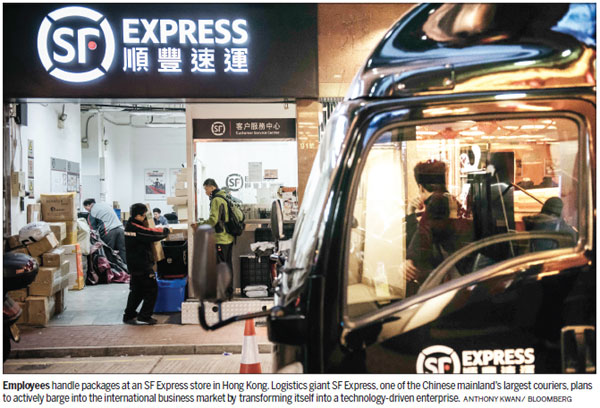'Holding hands' courier takes on the world

Shenzhen-based SF Express in major push to help clients tap China market
Riding on the boom in cross-boundary e-commerce and globalization, air cargo and logistics giant SF Express (Group) Co - one of the Chinese mainland's largest couriers - is actively tapping into world markets by providing logistics-based solutions to clients eyeing to link up with the mainland.
According to SF Express' annual report, the company recorded revenues of 57.48 billion yuan ($8.6 billion) in 2016 - up 19.5 percent on the previous year's. Its international business, however, accounted for just 1.91 percent of the total.
David Adams, chief executive officer of the international business unit at SF Express, said going global will be the company's key focus in future development.
The group, founded in 1993 by billionaire Wang Wei, currently has more than 10 entities overseas, with the United States, Russia and South Korea being the top three markets in terms of revenue contribution. "The opportunities for SF are that we have a real strong foundation on the mainland. A lot of companies overseas want to trade with China and a lot of Chinese companies want to export, so there's a natural alignment with our core business in this globalization initiative," said Adams.
Adams was among SF's first batch of employees at the group's US office in 2012 soon after the Shenzhen-based courier took on the US market. The company had no outbound business then, with only one office and an agent, he recalled.
The past five years have seen robust growth as US shippers - even those who had not heard of SF - were thrilled to find a quality express company that ships goods from the US to China. Adams said the company stands out among its global competitors in that it provides value-added solutions to overseas clients who are not familiar with the dynamics of the Chinese market.
"We provide end-to-end solutions to our cross-boundary B2C (business-to-customer) clients who ship to China. We find the best way for them to clear shipments, and help them in the customs registration process - this is not just shipping from A to B," Adams added, describing it as "holding the hands" of overseas sellers who are new to the mainland market through hundreds of processes.
SF introduced a program this year to help sellers abroad connect with mainland buyers. Partnering with marketing vendors, the company helps global sellers to better understand the demand for their products on the Chinese mainland and look out for potential business partners for them.
Technology is a key strategy in SF's global drive, Adams stressed. With an office at Software Industry Base - Shenzhen's technology hub - SF has been seeking to transform itself into a technology-driven enterprise.
The adoption of information technology in the company's pre-clearing system, for instance, has helped cut clearance time for large shippers significantly. Before a shipment arrives, SF would have pre-registered the core declaration information of the shipments, electronically passed the information on consignees to customs, and verified the payment information. When the shipment does arrive, the clearance can be done within 24 hours - a big step forward compared with the traditional procedures that could take days.
According to Adams, another major difference, compared with its domestic rivals that also have international business, is that SF provides a single tracking number with high visibility in cross-boundary business.
One feature to note is that a parcel shipped from overseas might need to go through other countries before arriving in China. Through SF Express, customers do not need to go through several tracking numbers to trace it. While some domestic competitors also provide one single number, the information won't be available until the parcel arrives at its destination. SF's electronic system provides high visibility of the tracking number, so customers can have a detailed grasp of the parcel's logistics state from the time it's shipped until it arrives at their doorstep.
Delivery services on the mainland fall into two categories - franchise and direct model. Most of SF's domestic rivals, such as STO, YTO and Yunda, stick to the former model under which couriers focus on core sorting hub and line haul transportation, and leave pickup and last-mile delivery to its network partners. The direct model, which SF and Express Mail Service adopt, entails the company owning and operating all parts of the business.
For SF's international business, Adams said the company utilizes both modes depending on the region it operates in.
In markets closer to home like Singapore, South Korea and Malaysia, the company is more asset-heavy and has their own service stations and pick-up vans. For countries farther away, such as Australia, the US and those in Europe where SF has lighter assets, it teams up with local players to deliver services.
SF said in May this year it had entered into a 50-50 joint venture with US delivery giant UPS, with each side forking out $5 million to set up a Hong Kong-based company. Initially, the project will focus on mainland-US deliveries before expanding to Asian and European countries later.
In March, SF Express completed its "backdoor listing" on the Shenzhen Stock Exchange, resulting in a dramatic surge in the company's share price, making Wang, its chairman, the country's third-wealthiest individual.
evelyn@chinadailyhk.com


















